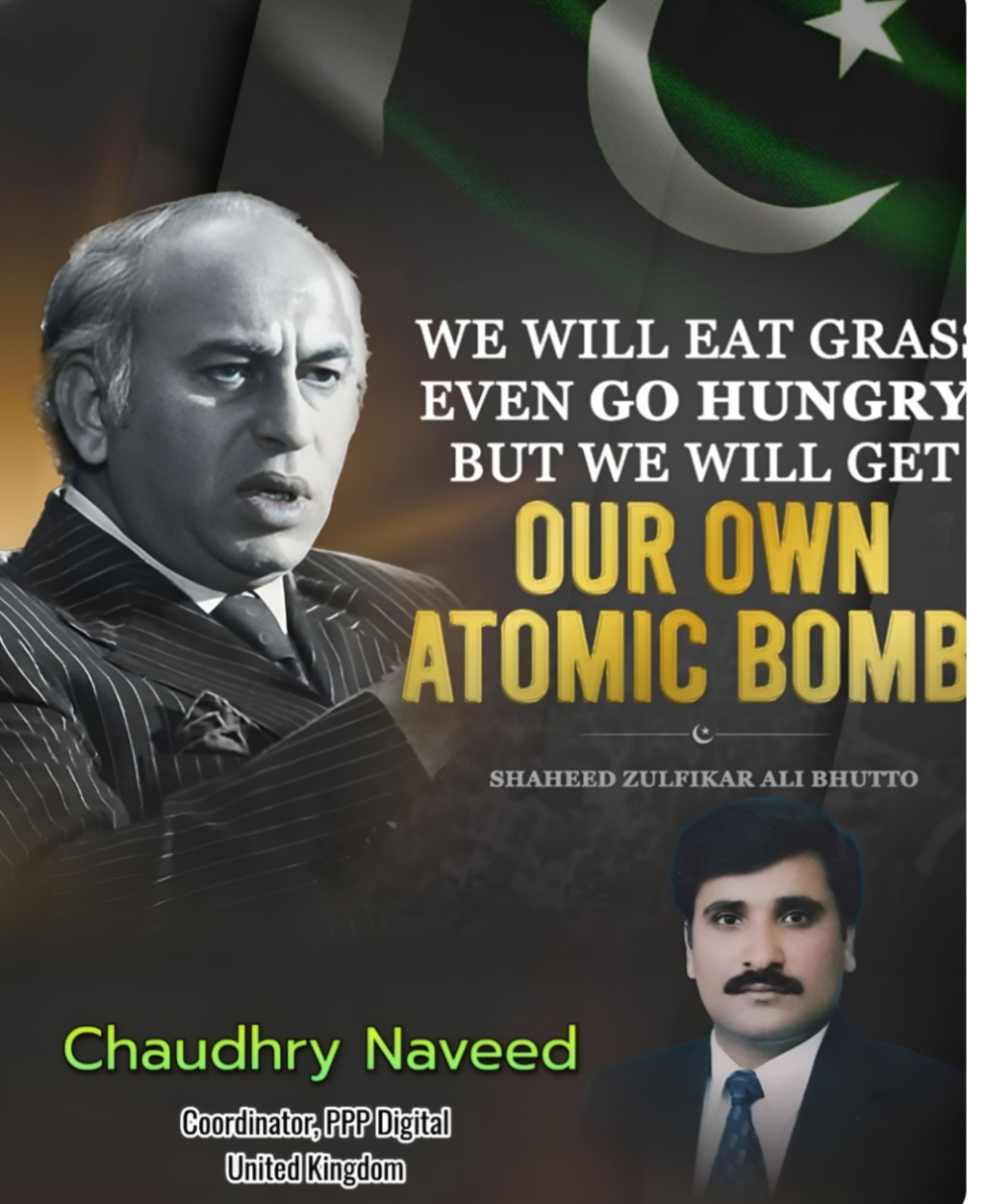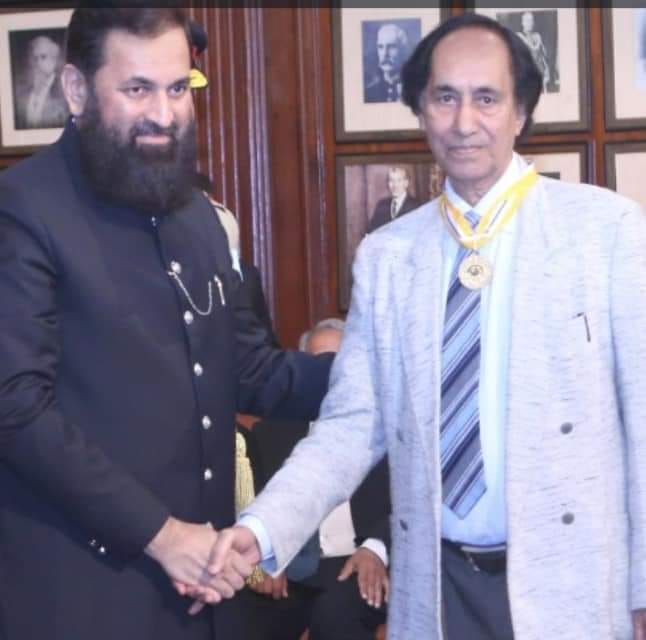Shaheed Zulfikar Ali Bhutto: A People's Hero
Champion of Democracy, and the Martyr Who Shaped Pakistan's Destiny

Shaheed Zulfikar Ali Bhutto: A People's Hero, Champion of Democracy, and the Martyr Who Shaped Pakistan's Destiny
By: Chaudhry Naveed
Coordinator PPP Digital UK
Date: 5th July
On the somber anniversary of July 5th, the nation of Pakistan reflects not only on the tragic fall of democracy in 1977 but also remembers with pride and pain the towering legacy of Shaheed Zulfikar Ali Bhutto — the founder of the Pakistan People's Party (PPP), a revolutionary Prime Minister, a bold Foreign Minister, and above all, a servant of the masses. His life, his struggle, and his ultimate martyrdom remain etched in the hearts of the people of Pakistan, who continue to revere him as a hero, a savior, and the father of modern Pakistan.
The Rise of a Visionary Leader
Zulfikar Ali Bhutto emerged on Pakistan’s political landscape during a time of deep uncertainty and national fragmentation. A brilliant scholar trained at the University of California, Berkeley and later at Oxford, Bhutto combined intellectual acumen with a deep understanding of the soul of his people. His early political career saw him serve as Foreign Minister under President Ayub Khan, where he quickly gained recognition for his fearless diplomacy and unwavering commitment to Pakistan’s sovereignty.
Bhutto’s bold stance during the 1965 war and his refusal to succumb to external pressure made him a household name. His resignation from Ayub’s government over national policy differences marked the beginning of a new era — the birth of the Pakistan People's Party (PPP) in 1967, under the powerful slogan: “Roti, Kapra, aur Makaan” (Food, Clothing, and Shelter).
The People's Prime Minister
Following the tragic events of the 1971 war and the breakup of East Pakistan, Bhutto took charge of a broken and humiliated nation. As the first elected Prime Minister of Pakistan, he led the country through its darkest hour with resilience, dignity, and unmatched vision.
Under his leadership:
The 1973 Constitution was drafted and passed — a landmark document that laid the democratic foundation of Pakistan and is still in effect today.
He repatriated thousands of Pakistani POWs and skillfully navigated the Simla Agreement with India, ensuring Pakistan's sovereignty and dignity.
He launched massive industrial reforms, nationalized key sectors, and initiated land reforms to redistribute wealth to the poor.
Bhutto’s government established Pakistan Steel Mills, expanded higher education, and founded numerous universities.
He ignited nuclear ambition for Pakistan, laying the foundation of a deterrent that ensured national security in the decades to come.
In every corner of Pakistan, from bustling cities to forgotten villages, Bhutto gave the poor and the powerless a voice. For the first time, they felt seen and heard. His charisma, oratory, and unmatched connection with the masses earned him deep love and unwavering loyalty — a bond that defied generations.
Champion of the Muslim World
Bhutto's international stature rose to prominence as he repositioned Pakistan on the global stage. He forged strong alliances with China, the Muslim world, and the Non-Aligned Movement. The historic 1974 Islamic Summit in Lahore, under his leadership, united leaders of the Muslim world and gave Pakistan immense prestige as a leader of the Islamic Ummah.
Why Was He Crucified?
The tragedy of July 5, 1977, saw the fall of Pakistan’s democratic dream when General Zia-ul-Haq, a military dictator, overthrew Bhutto’s elected government in a dark coup. The pretext of restoring order was a façade for silencing a leader whose popularity and mass appeal threatened the power of unelected elites.
What followed was one of the darkest chapters in Pakistan’s history — a judicial murder, where Bhutto was sentenced to death in a trial condemned globally for its flaws, partiality, and political motives. Despite international appeals for clemency, Bhutto was hanged on April 4, 1979, in Rawalpindi — an act that remains a deep scar on the conscience of the nation.
Legacy of Immortality
Even in death, Zulfikar Ali Bhutto lives on. His ideas, his sacrifices, and his fearless defiance of tyranny inspire millions. His daughter, Shaheed Mohtarma Benazir Bhutto, continued his mission, herself falling victim to the same forces of extremism and authoritarianism. Today, his grandson Bilawal Bhutto Zardari, carries forward the flag of democracy, labor rights, and people's empowerment.
From Larkana to Lahore, from the mountains of Gilgit to the plains of Punjab, the name Bhutto evokes tears, pride, and a sense of belonging. Songs are sung in his name. Walls bear his slogans. His mausoleum in Garhi Khuda Bakhsh remains a place of pilgrimage for millions.
Conclusion: A Martyr for the Nation
Zulfikar Ali Bhutto’s life was not merely a political journey; it was a revolution. A revolution that empowered the powerless, gave the poor hope, and challenged dictators with unmatched courage.
As we remember him on this 5th of July, let us not mourn alone. Let us vow to protect democracy, stand against tyranny, and honor the dream of the man who gave his life for his people.
“Zinda hai Bhutto, zinda hai” is not a chant — it is a testament to the undying love of a nation for its martyred leader.


No comments yet.